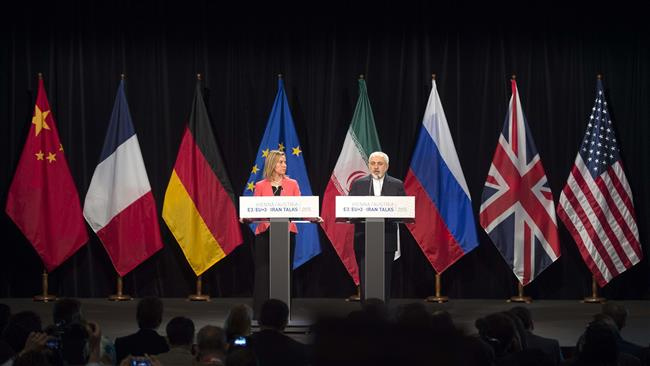Iran Should Take Advantage of the International Anti-Trump Consensus over Nuclear Deal

Speculations have it that Donald Trump will announce Iran’s failure to comply with the spirit of the nuclear deal on October 12. Anticipating US withdrawal in an interview conducted last week in New York, Iran’s Foreign Minister Javad Zarif said Iran has it own options, including walking away from the deal. In recent days, The Washington Post has also quoted US officials, saying Trump would refuse to endorse Iran’s compliance with the JCPOA, leaving it for the Congress to decide.
Trump justifies the decision with Iran’s alleged destabilizing measures in the region, its missile program, and the nuclear deal being against the national interests of the US. Considering Trump’s personality traits and his ambiguous remarks in recent years, the announcement seems to be imminent. It is also not very difficult to predict the Congress decision on the nuclear deal, given the Republican majority in the legislative body. Congress is expected to impose new sanctions against Iran. Obviously, that is a breach of the agreement, meaning the US has withdrawn from the JCPOA.
What should Iran’s reaction be? The first and foremost argument for Iran, justifiable and acceptable with the P5+1 group and other countries in the world, would be the statement that the nuclear deal is not a bilateral but international and multilateral agreement signed by four permanent members of the UN Security Council, other than the US, and Germany. Moreover, the deal has been endorsed by the United Nations. According to the letter of the deal and the provisions of the UNSC Resolution 2231, United States’ violation of the deal on the pretext of Iran’s missile program cannot be accepted by the international community.
Beside global opposition vis-à-vis US’ unilateral measures, the International Atomic Energy Agency has confirmed Iran’s compliance to all provisions of the JCPOA in eight reports since the implementation of the deal. From this perspective, Iran has a firm foothold in the international scene.
Inside Iran, there are two approaches regarding Iran’s response to the United States’ potential breach of the deal. One side believes Iran should demonstrate a harsh response and quickly resume its nuclear program. The group, probably those so-called solicitous opponents of the nuclear talks, say they knew the US was untrustworthy from day one and we should resume the nuclear program with full force, trying to return to our status before the deal. The other group is on the belief that Iran should exercise patience in the face of all US measures and mobilize the world against US’ unilateral measures through active diplomacy.
Trump’s hard stance has isolated the US in the issue. Unlike the pre-deal era when the whole world was united against Iran, the world is now united against the United States, particularly so because Trump’s measures regarding other international agreements has sparked international opposition. It seems that Tehran has reached the conclusion to abstain from measures that raise suspicion on Iran’s violation of the deal. In doing so, even rhetoric of threat and saying Iran could return to the pre-deal situation is not in the interest of Iran because these could justify Trump’s anti-deal decision, giving them wider bargaining space with the other signatories of the deal and the international community. Even Iran’s rationale of not returning to the table over the nuclear agreement has been welcome by world actors and the US has failed to find company in its position. Therefore, Iran should emphasize that it remains faithful to the commitment it has signed, leaving it for other signatories to make a decision about the United States’ breach. This would impress the world’s public opinion, attributing the consequences of Iran’s potential response to the White House and Congress. The recent stance adopted by the Trump administration is driven by rage and absolutely in Iran’s interest. Unlike the past, when Iran was under international diplomatic pressure, the US is now standing with an unacceptable position against the international community, putting world peace and security at risk with its return to militarism. Therefore, time is ripe for Iran’s active diplomacy in the international scene. A final point is that in case of US withdrawal, the domestic opponents of the deal should bow their head before the Iranian negotiators and express remorse rather than take delight because Trump has repeatedly called the deal against US’ national interests and an embarrassment to the country. The confession proves that Iran has taken the right path.

